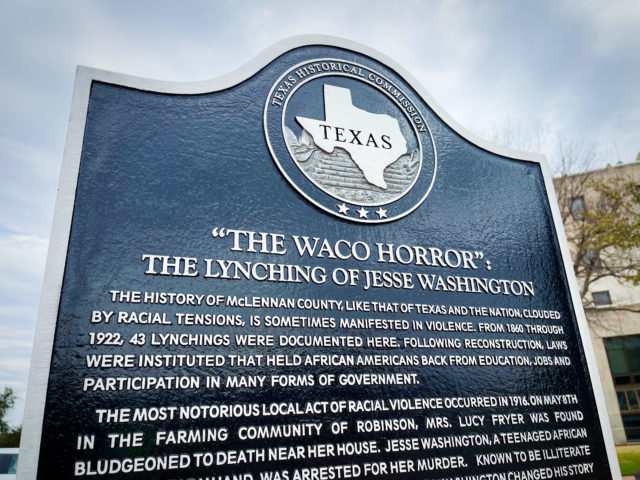By Raylee Foster | Staff Writer
The Community Race Relations Coalition and the City of Waco worked for seven years to put historical recognition in place; however, the fight against lynching has been going on for much longer.
A marker for Jesse Washington was placed Sunday, Feb. 12, in front of Waco City Hall. This marker is not just in remembrance of Washington, but serves as a physical recognition of Waco’s history of lynching.
Jo Welter, a coalition board of directors member, said the coalition has devoted time to lynching issues well before the marker became a project.
“We’ve been working on [the marker] for seven years, but we’ve been working on what we call the ‘lynching issue’ for 17 years,” Welter said.
The fight to get the marker commemorated was put in motion back in 2016, before the 100th anniversary of Washington’s death. Members of his family met with the coalition and had only one request.
“At that meeting, one of the questions that one of us asked was, ‘What’s the most important thing to you in recognizing this?’” Welter said. “They said, ‘a formal acknowledgment, like a marker.’”
The coalition board discussed commemorating a marker for Washington before this, but, the family’s request inspired immediate action.
Welter said the marker serves justice for all those who suffered the inhumane practice of lynching throughout Waco’s history.
“We were not just focusing on Jesse Washington’s lynching. We really felt from the beginning we wanted to focus on also the lynching culture that existed here,” Welter said.
Washington’s lynching was not a stand-alone incident. His death was one of 43 that occurred in Waco between 1860 and 1922, according to the Jesse Washington complete narrative constructed by the coalition. His death marked violence unrecognized, the 1916 lynching was an act of terror — and its effects are still felt today, Welter said.
“We want to point the finger at other countries and other cultures and things being terroristic, but we have been very terroristic throughout our history, and this was nothing but pure terrorism. It was horrible,” Welter said. “There are so many lasting effects from this. This was meant to keep a group of people in their place, and five generations later, it still does. There are many people of color in Waco who don’t feel everything is open to them.”
Feb. 12 also marked the 114th anniversary of the founding of NAACP, an organization whose advocation against Washington’s lynching in 1916 resulted in a national response to what had occurred.
“The NAACP in 1916 had everything to do with the fact that Jesse Washington’s barbaric, horrible, unbelievably awful lynching became internationally known and it changed the perception of Waco forever,” Welter said.
Waco NAACP president Dr. Peaches Henry said the chapter’s goals have always involved lynching laws and Jesse Washington’s death was one of the injustices they hoped to raise awareness for.
They sought to invoke a moral and emotional response in society to act against these unfair treatments.
“Raising awareness is not the right word because people were perfectly aware of what was going on. What they were attempting to do was raise outrage,” Henry said. “They wanted to get people to be so morally outraged by what they saw that they would act.”
The NAACP has continued this fight into the 21st century. Henry said it wasn’t until March 2022 that anti-lynching laws were put in place in all 50 states.
This victory, however, did not mark the end of the fight. Henry said she encourages people to stay involved and for students to make their mark, particularly to “vote where you sleep.”
“We are to continue the fight, to continue to stand up for our rights,” Henry said. “The work of any justice organization is ongoing. The fight never stops because the people who would deny other people their rights in all kinds of forms never stop attempting to do that.”
Welter said she encourages the community to reflect on each member’s individual contribution. Although she cannot predict what will come from the marker, she said she believes the recognition of the past is what will spur healing and encourages Wacoans to be a part of it.
“We don’t tell people how to be, we try to provide situations for them to learn and I always encourage people to say not what can we do, but what can I do,” Welter said. “I called on everyone last Sunday to look inside themselves and really deal with the truth.”



